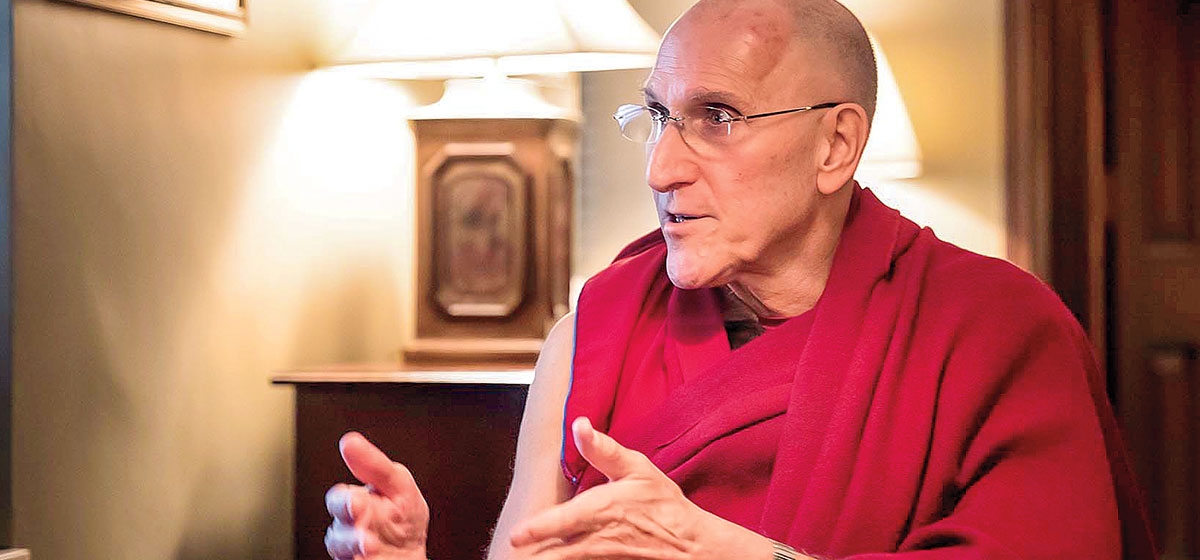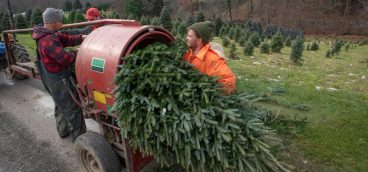Holiday Thoughts from the Dalai Lama’s Physician

Dr. Barry Kerzin, Buddhist Monk and physician to the Dalai Lama, is back in Pittsburgh, continuing his work with UPMC nurses, building compassion, resilience and mindfulness into their daily activities, with the goal of decreasing stress and increasing fulfillment. (See a longer PQ story on Kerzin here). He is in discussions to possibly begin similar work next year with the Pittsburgh Police. Pittsburgh Quarterly Editor Douglas Heuck spoke briefly last week with Dr. Kerzin about the significance of the holiday season.
When you were growing up in Hollywood, I presume your concept of Thanksgiving was similar to that of any American kid. How do you view it now and do you practice it if you’re overseas on the actual day?
When I was growing up in California, Thanksgiving was a wonderful holiday. We got time off of school, got to eat stuffing, turkey and cranberry sauce. I probably felt like any other other American kid about Thanksgiving—a time to be with family, and I enjoyed it a lot. Now that I’ve lived outside the U.S. for the last 30 years, other people don’t celebrate it. So I’m not with family at those times. I don’t eat turkey—I’m a vegetarian. I love the holiday, but because of my lifestyle, I celebrate it less and less.
So I’m less keyed into the holiday of Thanksgiving, but the notion of thankfulness, gratitude, giving, and generosity—these are things I try to make much more part of my life. So the real meaning of Thanksgiving is with me more of the time than just the last Thursday in the month of November. Last night, I jotted down some thoughts that are central—one could say crucial—if one is wanting to live a more happy, fulfilling and meaningful life.
“Little things count. Remembering the things that went well at the end of the day; taking a deep breath or two when stressed; seeing the glass as half full; and listening to the birds sing. All are little ways of taking good care of ourselves, but adding them up, they become a big thing. Being silent; hearing the wind rustle through the trees; watching the butterfly dance from flower to flower; and noticing the clouds drift and change shapes. These are all ways of balancing our life and feeling whole. Slowing down to the pace of nature; skipping while humming a tune and holding a smile; and just observing the world, free of judgment are all ways of centering our lives. Smiling with others, opening the door for them, and saying hello are ways of opening the heart. Adding all these little things together creates a life that is bigger than its parts. Happy Thanksgiving to all.”
I just saw the new movie on Fred Rogers, and when I read those words that I wrote last night, I get a smile on my face, because it feels a little like Fred Rogers.
Did you celebrate Christmas as a youngster? Being a Buddhist, how do you view it now?
I grew up in a reformed Jewish family, where the emphasis was on humanism. Being a good person and being kind to others was particularly my mother’s teaching to us kids.
We celebrated Christmas, and Christmas is still a meaningful time of year for me. If I happen to be in the states—every other year–ish—I notice that in general people are more kind, more willing to engage.
I know very deeply as a physician that it’s a very difficult time of year for some people. It’s the time that families come from afar to come together. So people who’ve suffered a loss, who are going through a difficult time, or have virtually no communication with family—they suffer tremendously, feeling the losses that happened during the year or before. They can feel very isolated and very depressed. Suicide rates go up. But generally most people are happier, a little more relaxed and more in a giving mood—so I enjoy that very much.
Finally, the seasons play heavily into many of the holidays we celebrate, with the timing of many Christian and some secular holidays having been grafted onto ancient holidays based on the seasons. This may be a stretch, but do you see the seasons—and particularly the coming winter—having a role in your Buddhist tradition?
I’m going to stretch here a little bit, but the answer is yes. Winter is a season where we have much less light externally. For many people it’s a quite colder season, so we tend to be more inside to protect ourselves. And so we’re almost forced to be with others more. We hear about relating to others with unconditional love, reciprocal respect and trust. So now that we’re cloistered inside more of the time, it’s an opportunity for us to put those thoughts and practices to work. We have to walk the talk. We have to actually start to do those things.





